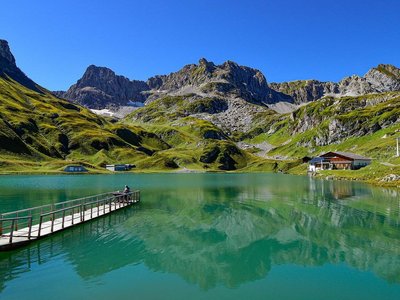

Early in the morning, we took the train from Vienna across Austria to the other end of the country. Destination: Dornbirn, Vorarlberg - the most populous city in Austria's westernmost state and this year's venue for the Austrian Citizen Science Conference. An estimated 150 researchers, science communicators, Citizen Scientists and other interested parties met at the city's Kulturhaus during the day from June 28-29, 2022, and in the evening for a cozy get-together at the inatura museum. A diverse program of lectures, workshops and training sessions awaited the participants. The Science Day on June 30, 2022 invited the public to immerse themselves in Citizen Science in the marketplace at inatura. As in previous years, the atmosphere at the conference was very relaxed, with the citizen science community engaging in lively exchanges even during the coffee breaks.
Snapshots from Day 1: From Motivational Research to Citizen Science in Schools
The first conference day started with the keynote "Motivation and Manipulation in Citizen Science Projects" by Nicola Moczek from PSY:PLAN in Germany. She explained that projects would often collect little or no information about their participants. The reasons for this are, on the one hand, data protection and, on the other hand, that they do not know how to collect the data due to a lack of tools. A major challenge for motivation research! In addition, there is a lack of representative cross-sectional studies in the field of citizen science in Germany, in contrast to volunteer work. In the course of her work on the motivation of citizen scientists, Nicola Moczek identified several wishes of the citizen scientists that would play a major role in motivation. Among other things, the participants would like to receive quick feedback on the joint successes and challenges of the project, genuine appreciation, personal exchange with the researchers, and a variety of offers to participate in research at different levels.
On the same day, we from the OeAD Center for Citizen Science together with two other colleagues from the working group "Citizen Science at/with schools" invited to our workshop "'Citizen Science - Researching with schools' - The tips & recommendations of the brochure in a reality check". The aim was to discuss with the participants the WG brochure "“Citizen Science – Research with Schools. Basics, recommendations & practical tips for joint projects" in order to improve it in the future. We asked ourselves the following questions: Were important aspects overlooked? Where can additions be made? In the form of a world café, we discussed the topics "added value", "anchoring citizen science" and "project management". In the course of the workshop, there were lively discussions and one or the other missing aspect was brought forward. We would like to take this opportunity to thank the participants once again!
Snapshots from Day 2: From Responsible Research and Innovation to Citizen Science
On the second day of the conference, Erich Griessler from IHS gave a keynote in which he recounted his experiences in the EU project NewHoRRIzon 2017-2021), trying to answer the question or the conference motto "Citizen Science - Why not?". The goal of the EU project was to find ways to integrate Responsible Research and Innovation (RRI) into research and innovation systems at national and international levels. Looking at the aspects of RRI (Science Education, Equality, Gender etc.) one finds a large intersection with citizen science. This means that the integration of RRI also has a great impact on citizen science. The EU project organised e.g. 19 Social Labs with diverse stakeholders, created a MOOC on RRI, and published the Societal Readiness Thinking Tool. During the course of the project, the project team encountered numerous challenges and questions that researchers of citizen science projects also face. Some related to how to find the "right" participants and motivate them: How do I identify stakeholders? How do I get groups of participants that are particularly difficult to recruit (e.g., policy makers, industry, skeptics)? How do I deal with the loss of participants and how do I attract new ones? Finding the right methods for the joint work was also not an easy task: What workshop methods are appropriate for creating engagement and ideas and implementing action? How do I manage disinterest in collaboration? How do I deal with criticism of methods and concepts? How do I deal with not having enough resources to promote activities? In the end, Erich Griessler returned to the motto and closed his keynote with the encouraging conclusion: in the current science system, numerous hurdles exist for citizen science, but these can be conquered. However, it needs a lot of work!
We would like to thank inatura and the Citizen Science Network Austria for the great organization of the conference. These were again exciting days with a lot of input, inspirations and networking opportunities. The next Austrian Citizen Science Conference 2023 can come!
Foto impressions of the conference
